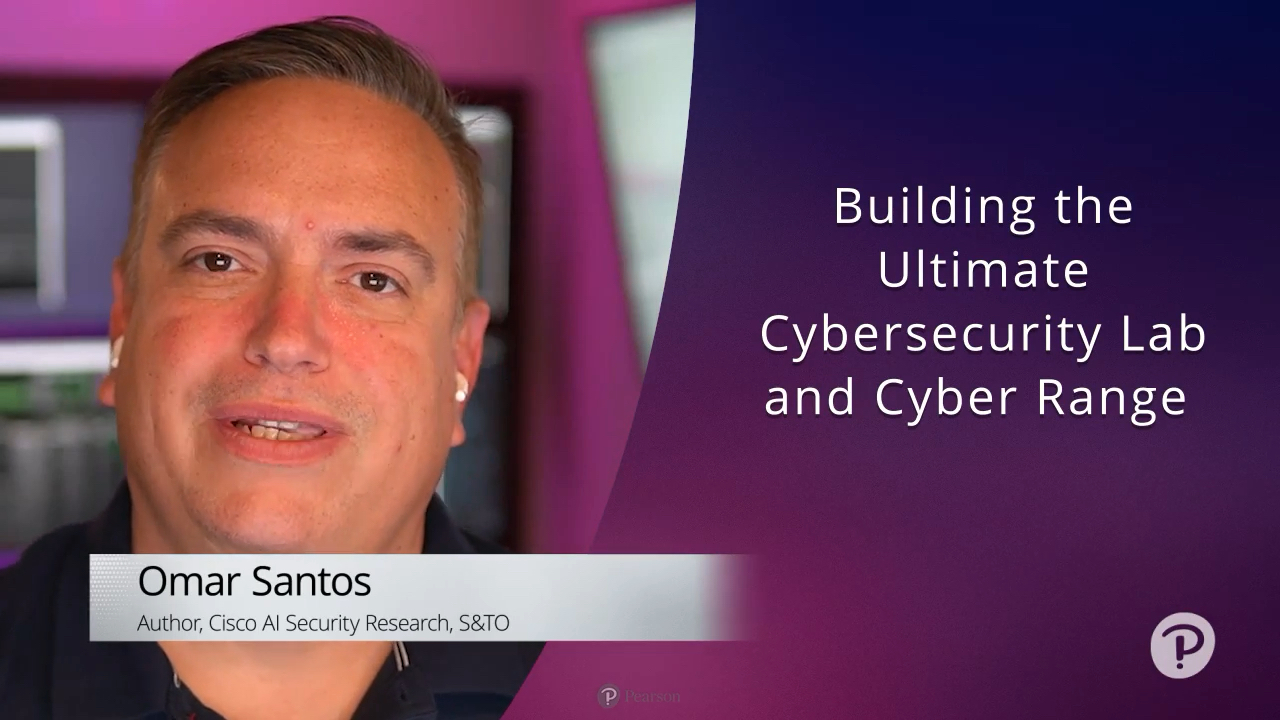Building the Ultimate Cybersecurity Lab and Cyber Range (Video Course)
- By Omar Santos
- Published Dec 20, 2023 by Addison-Wesley Professional.
Online Video
- Your Price: $239.99
- List Price: $299.99
- About this video
Video accessible from your Account page after purchase.
Register your product to gain access to bonus material or receive a coupon.
Description
- Copyright 2024
- Edition: 1st
- Online Video
- ISBN-10: 0-13-831907-3
- ISBN-13: 978-0-13-831907-6
3 Hours of Video Instruction
Practice and enhance your Ethical Hacking and Defensive Security Skills!
Take your first step to building your very own cybersecurity lab and preparing for the future of cybersecurity. Building the Ultimate Cybersecurity Lab and Cyber Range is a vital resource for anyone serious about learning hands-on cyber skills. It is also an essential resource to study for a variety of cybersecurity certifications, including Certified Ethical Hacker (CEH), CompTIA PenTest+, CEH Practical, Offensive Security Certified Professional (OSCP), Cisco CCIE Security, or CCNP Security.
The course serves as a comprehensive guide for those beginning their journey in penetration testing, exploit development, or malware reverse engineering; it covers how to build yourown virtualized, physical, or cloud-based environment to practice your skills in a safe ecosystem.
Sign up for cybersecurity live training classes by Omar Santos
Topics covered:
- How to create a lab for offensive and defensive cybersecurity concepts
- Learning and obtaining access to numerous tools that you can use to practice your skills, from virtual machines (VMs), Docker containers, and intentionally vulnerable systems
- Learning how you can leverage tools like Virtual Box, VMWare Workstation/Fusion, ESXi, Proxmox, or even OpenStack to build your own cyber range
- Learning how to create environments in cloud services such as AWS, Azure, Google Cloud, and Digital Ocean.
Skill Level:
- Beginner to Intermediate
Learn How To:
- Build virtual, physical, or cloud-based cybersecurity lab.
- Use tools like Vagrant, Terraform, and Ansible to automate complex and repetitive tasks.
- Practice safe and refine a variety of offensive and defensive cybersecurity techniques.
- Get skillset to deploy and manage secure environments on various platforms and cloud services.
Course requirement:
- Course participants should have a basic understanding of computing and networking.
- Supplemental information and additional material for this course can be accessed at https://h4cker.org/labs
Who Should Take This Course:
- You are interested in cybersecurity
- You are preparing for the cybersecurity certifications
- You want to learn about the different ways that you can practice your skills in a safe environment
- You want to learn different tips on how to create multiple
About Pearson Video Training:
Pearson publishes expert-led video tutorials covering a wide selection of technology topics designed to teach you the skills you need to succeed. These professional and personal technology videos feature world-leading author instructors published by your trusted technology brands: Addison-Wesley, Cisco Press, Pearson IT Certification, Prentice Hall, Sams, and Que Topics include: IT Certification, Network Security, Cisco Technology, Programming, Web Development, Mobile Development, and more. Learn more about Pearson Video training at http://www.informit.com/video.
Video Lessons are available for download for offline viewing within the streaming format. Look for the green arrow in each lesson.
Sample Content
Table of Contents
Introduction
Lesson 1: Introduction to Cyber Ranges and Starting a Home Lab
1.1 Introducing Cyber Ranges
1.2 Building a home lab and typical hardware requirements
1.3 Building a lab for ethical hacking, bug bounties, and penetration testing
1.4 Most common Linux distributions
1.5 Introducing WebSploit Labs
1.6 Building labs for incident response, threat hunting, and digital forensics
Lesson 2: Building Scalable Lab Infrastructures
2.1 Building your own private cloud with OpenStack
2.2 Introducing Proxmox and deploying VMs and containers
2.3 Installing Proxmox featuring advanced deployments and clustering
Lesson 3: Surveying Lab Requirements for Wi-Fi and IoT Hacking
3.1 Hardware requirements for wi-fi hacking
3.2 Hardware requirements for IoT hacking
3.3 Using Linux Kernel modules to build a wireless hacking lab without the need of physical adapters
Lesson 4: Building Your Lab in Cloud Environments
4.1 Building a lab in AWS
4.2 Building an Active Directory hacking lab in Azure
4.3 Building your lab with AI and interacting with hundreds of APIs
Lesson 5: Automating Lab Deployments and Tasks
5.1 Using Vagrant
5.2 Using Ansible
5.3 Using Terraform
Lesson 6: Building Labs for Malware Analysis
6.1 Best practices when handling and detonating malware for analysis
6.2 Creating sandboxes for malware analysis
Lesson 7: Introducing Honeypots and Honeynets
7.1 Comparing honeypots and honeynets
7.2 Building a honeypot and honeynets on-premises and in the cloud
Summary
More Information

